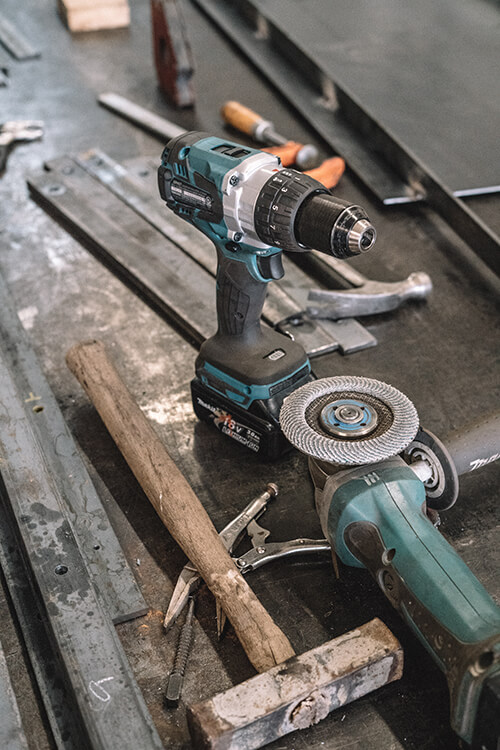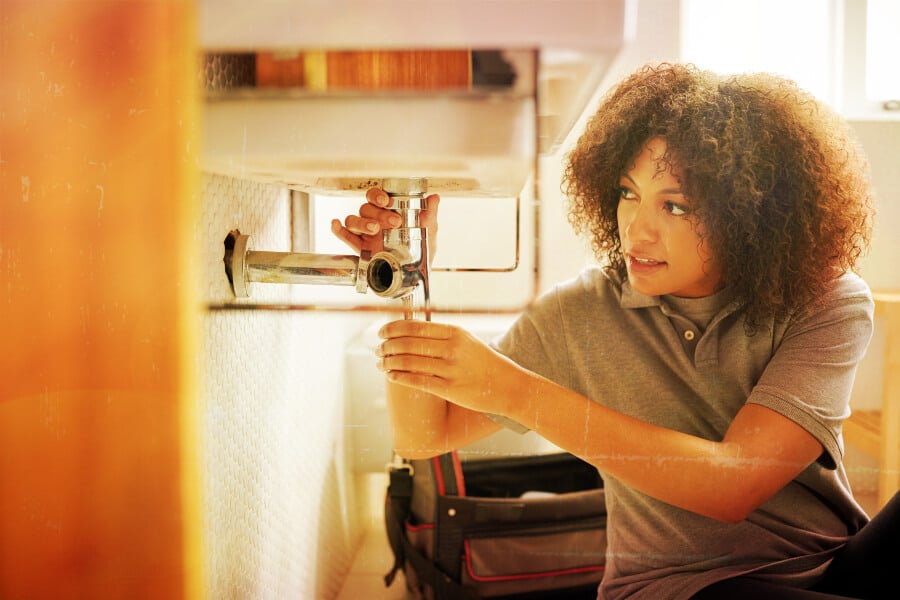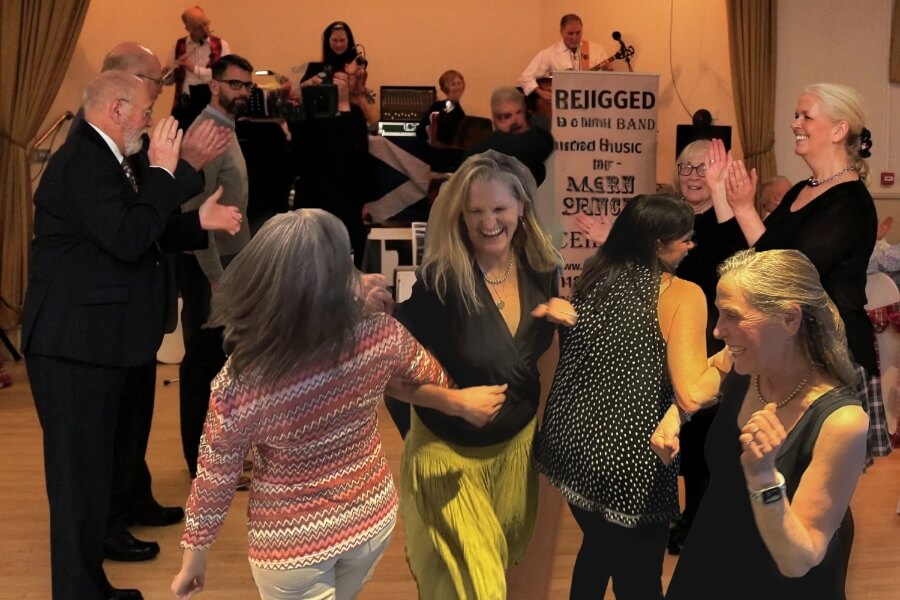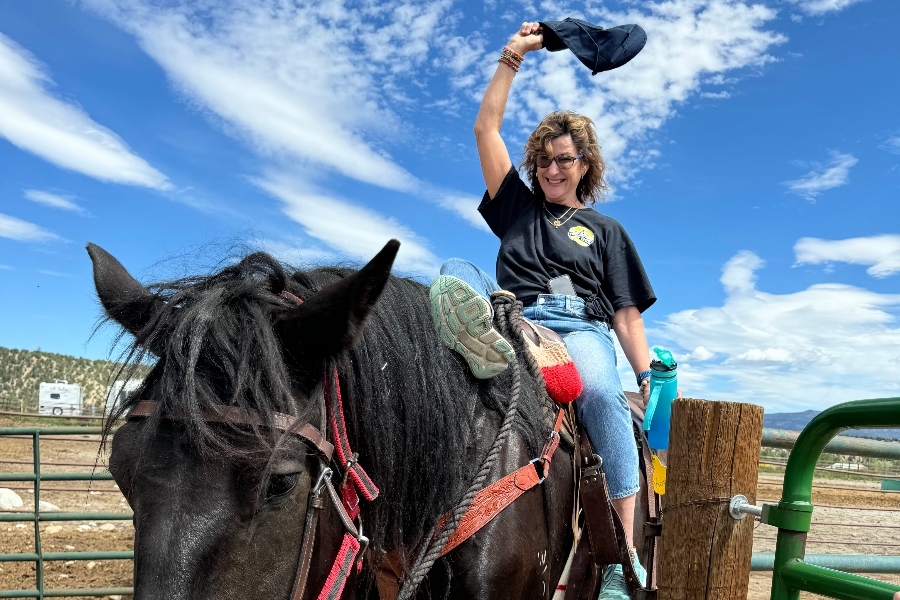I have something to confess: Despite the fact that I’ve been self-identifying as a feminist ever since I became a charter subscriber to the new Ms. magazine back in middle school, I still think of certain household chores as “boy jobs.” Or at least, that’s how I saw it over the 25-plus years I cohabitated with my husband Bill, who tackled the manly tasks at home.
These jobs included stopping the toilet’s glub-glub-glub noise, mowing the lawn, navigating Home Depot, taking out the garbage, fixing/installing things with power tools, dealing with the appliance guy when the dryer stopped working, and doing anything with the car’s innards. (Okay, this is just a partial list.)
I’m sure much of this attitude was learned at home. Though my parents’ marriage was egalitarian and my mom was the clear alpha, their relationship was also a product of the times: When my oldest brother was born, my mother gave up a beloved career in radio to stay home, and my dad commuted to the city each day to work. My sister and I were raised to think about careers, not marriage, but, still, my mom cooked dinner most nights, handled the household, and ironed my dad’s shirts. My father—an engineer by training and an all-around handy guy—fixed anything around the house that broke, mowed the lawn, and lugged the garbage to the curb. And as my two brothers grew up, they took over many of his chores, and he taught them how to do stuff.
Read More: An Insider’s Perspective on Ms. Magazine’s 50th Anniversary
What Exactly Is a Boy Job Anyway?
Here are some of the chores my brothers did that I never had to do: Climb up on a ladder to clean the leaves out of the gutters. Change the snow tires. Swap out the heavy window screens for the heavier storm windows.
Some of the things my brothers learned that my sister and I didn’t: how to build a fire in the fireplace and get the flames just right in the charcoal BBQ grill.
And here are some of the things my brothers learned that my sister and I didn’t: how to build a fire in the fireplace and get the flames just right in the charcoal BBQ grill; how to use a soldering iron, a power drill, a table saw; how to change a washer in a dripping sink; how to swap out an electrical socket.
My sister and I were taught how to sew, iron a shirt, make a flaky pie crust, and fold a fitted sheet (that lesson didn’t take). We dusted, vacuumed, did laundry, and set the table for dinner. Once, when I was about 12, I asked my dad to let me try out the new power mower, but he thought I’d cut off my toes.
My Marriage’s Division of Labor

Image: Sidney Pearce/Unsplash
My marriage was also an egalitarian one: We both worked full time, including after our two daughters were born. Bill did his own laundry, took his shirts to the dry cleaner, cooked dinner more often than I did, and wasn’t bothered at all when my salary gradually caught up to and surpassed his.
But he also took out the garbage, unclogged the toilet, hung the shelves, haggled with car salesmen, and took the car in for oil changes and inspections. Like my dad, he was a whiz with a power tool and climbed up on tall ladders to fix gutters and reseal windows.
I was aware of and uncomfortable with the fact that I avoided these tasks; the gender divide didn’t suit my view of myself as a smart and capable female. Too often I fell back on the, “Well, my dad didn’t teach me” or the “power tools scare me” excuse. And when it came to things that were so clearly easy but un-fun (like garbage duty), I felt like I was shirking.
I was aware of and uncomfortable with the fact that I avoided these tasks; the gender divide didn’t suit my view of myself as a smart and capable female.
In truth, though, there wasn’t a chore imbalance, especially after we had kids. He was an involved dad, but I did much more of the hands-on, nitty-gritty part of parenting. Like so many moms, I was the family memory bank: I remembered to make the pre-camp pediatrician appointments, that tomorrow was both the third grade field trip and the pre-K “wear a funny hat” day, that sleepovers at Emily’s house were a bad idea, that the SATs were in six months and I’d better find a prep course before they were all filled up. I combed the knots out of the girls’ hair, got the stains out of their shirts, found the brand of socks without annoying toe seams, and knew that when Kate wanted her “pinkish” dress, she meant the purple one. But I was also more tech-savvy (in those days, that meant I knew how to program the DVD player and unfreeze the computer) and was much better at following directions when putting together IKEA furniture.
There were some arguments and resentments over the years, but it was a fairly peaceful division of labor. And then one day, when the girls were teens, Bill went up to take an afternoon nap and didn’t wake up.
Making Manly Jobs My Own

Image: Philipp Kämmerer/Unsplash
A month after Bill passed away, the car died too. To say that I’m not a car person is a vast understatement: I was just north of age 50 and had never owned one of my own. Figuring out what to buy wasn’t hard—I’m a journalist, I know how to research stuff—but the thought of dealing with the logistics of haggling and financing both terrified and exhausted me. So I took a baby step: I made the appointment, then brought my brother along to make sure I wasn’t being snookered.
I was determined not to miss BBQ season that grieving summer but couldn’t even move Bill’s behemoth grill—so I navigated Home Depot, bought myself a small gas Weber, and learned how to grill. Some of those summer nights, I came home from work to a quiet house and grilled a frozen veggie burger, just to have the pleasure of cooking outside. And then one night it wouldn’t light. Weber sent me a replacement part, and I—in one of my proudest boy job moments—took apart the inside of the grill and figured out how to fix it and put it all back together.
Eight years later, I accept that most of the jobs—the boy jobs, the girl jobs—are mine.
Single mothers and single women, of course, don’t have the benefit of dividing labor, and now I was among their ranks. And eight years later, I accept that most of the jobs—the boy jobs, the girl jobs—are mine. My brother and brother-in-law are a huge help, especially when it comes to high ladders and heavy schlepping, but I take out the garbage, deal with the plumber, the appliance-fixer, and the sprinkler guy, rehang the shelf when it falls down, and unclog the toilets. I have become something of a handy woman.
When it came time for a new car, I went by myself. (I still don’t touch the innards, though I’ve gotten very good at reading the manual to figure out why this or that light is flashing on the dashboard—and then I call one of my brothers.) I only mowed the lawn once before I decided—amputated toes dancing in my head—to outsource that job.
Sometimes, of course, it felt like too much—doing so many of those tasks I used to ignore, along with all the parenting stuff: college applications, PTA meetings, broken curfews, teenage heartbreaks. Sometimes it still feels like too much. But then I’ll haul out the hammer or the screwdriver, look at that tipsy shelf or that loose doorknob, and just get the job done.
Read More: I Blinked and Now I’m the Oldest Person in the Room
***
Lisa Bain has worked as an editor in publishing for more than 30 years, covering health and issues related to women and families. She’s the editor of Dr. Oz The Good Life and executive director of Hearst Lifestyle Group’s health newsroom. She has two daughters and lives in the New York City area.
A version of this article was originally published in November 2018.
Further Reading
Dare to Repair: A Do-It-Herself Guide to Fixing (Almost) Anything in the Home





















0 Comments